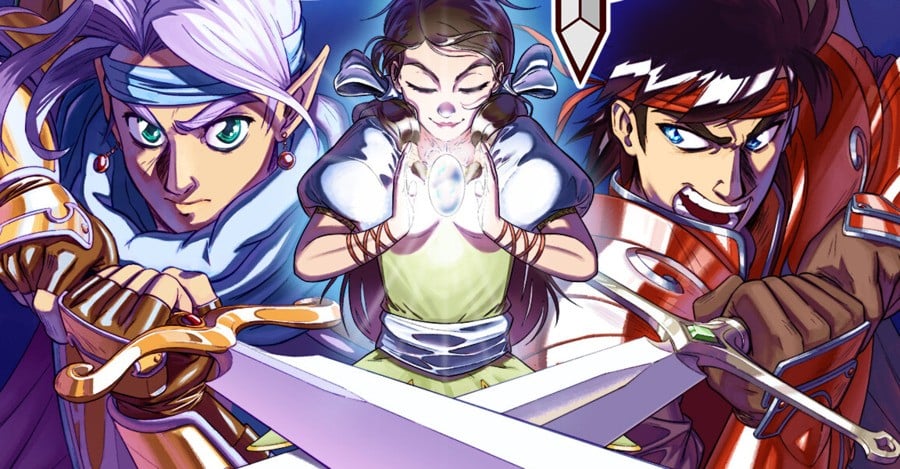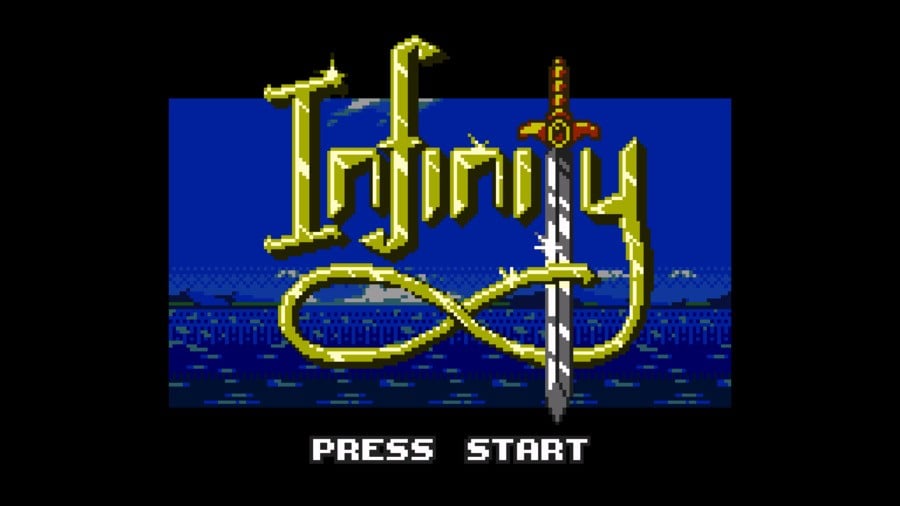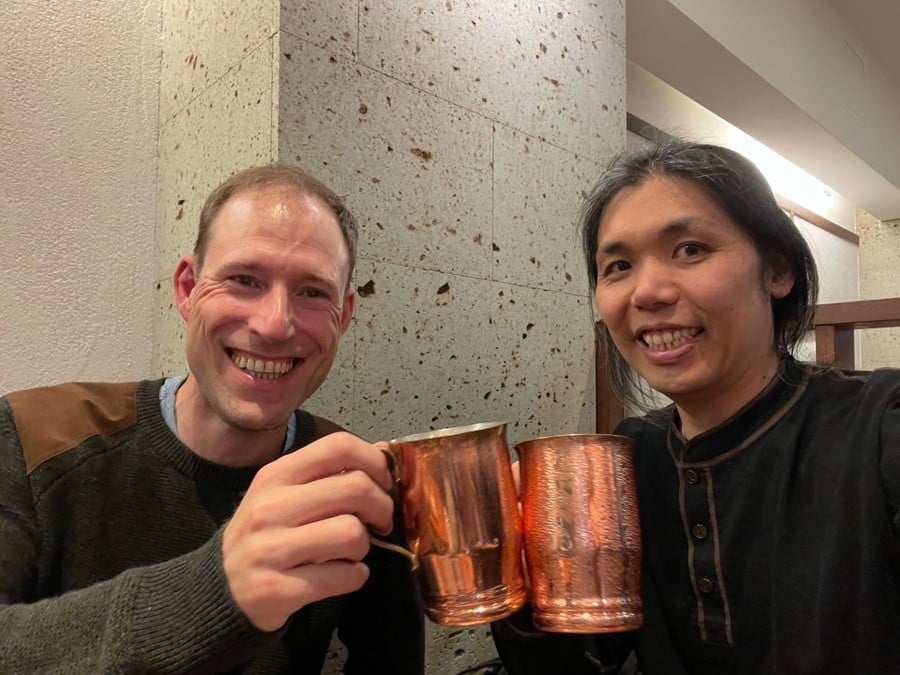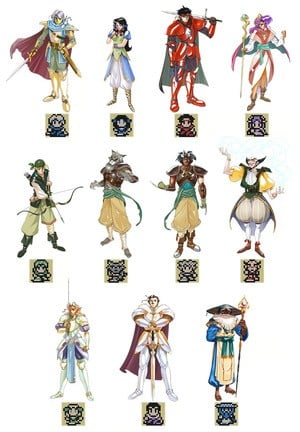
The story of the Game Boy Color role-playing game Infinity isn't one you hear every day.
The project started life back in 1999 at a small Californian company called Affinix Software and was envisioned as a love letter to Japanese role-playing games. However, after years of work, it was eventually abandoned around 2002 after the team was unable to find a publisher when the market started to favour Nintendo's newest handheld platform, the Game Boy Advance.
In the years that followed, the developers all went on to other things inside and outside of the industry. But, unlike many games that typically stay dead and buried after they are cancelled, Infinity had a habit of reentering its creator's lives at various points. First, through the release of an unfinished ROM and soundtrack in 2016 and then later on, through the launch of a Kickstarter from the publisher Incube8 Games in 2021 that aims to finally finish the game with the help of some new blood, as well as a few of its original team members.
Over the past few years, the team behind Infinity has been hard at work enhancing what remained of the original game and implementing what was missing from the 2016 release and is currently aiming to ship to backers in Q3 2025 (with a general sale planned for sometime between Q4 2025 and early 2026). In other words, a release is still a little way out. Nevertheless, we wanted to catch up with the team to hear more about the history of the project. This included talking to the game's original writer Mark Yohalem, the audio engineer Mathew Valente who has been working on the project on/off since 2001, the coder and translator Ichiro Ota who joined the team in 2021, and Incube8 Games' chief marketing officer Gary Doireau.
They were able to tell us more about the game's initial origins at Affinix, as well as its disappointing cancellation and amazing resurrection.
Affinix Software
Mark Yohalem describes himself as "a lawyer by day and a game designer by night". Since working on Infinity in the early 2000s, he's gone on to contribute writing for large gaming companies like Bioware, inXile, and TimeGate Studios, and has also worked on his own projects such as the adventure tiles Primordia and Strangeland.
According to him, the origin of Affinix begins with two people: Justin Karneges and Hideaki "Hid" Omuro, who knew each other from the TI calculator game development scene and both lived in Orange County, California. Karneges had developed a TI RPG called Joltima, which drew inspiration from the NES RPGs Ultima Exodus and Dragon Warrior, and Omuro had ported it over to another calculator, but they were both discussing the idea of using their TI Assembly programming skills to make a Game Boy Color RPG (initially called Joltima 2).

"Amazingly, Justin’s employer Matt Rossi was willing to give some funding for development," Yohalem tells us, "And the whole thing was off to the races. The team then grew to include an artist named Melvin de Voor and the composer Eric Haché. Eric in turn connected the team with me (as writer and content designer) and Mat Valente (as audio engineer). We were all in our late teens or early twenties. All of us had been trying to make JRPGs since we were very young, but none of us, as far as I know, had worked on any commercial projects."
We were all in our late teens or early twenties. All of us had been trying to make JRPGs since we were very young, but none of us, as far as I know, had worked on any commercial projects.
As Yohalem tells us, when he first joined the team in the year 2000, he was tasked with coming up with the story. This seemed to be the perfect fit for him, as, in the past, he had grown up playing classic RPG titles like Dragon Warrior side-by-side with his brother and had become hooked on the genre during the 16-bit era (with titles like Final Fantasy IV and V, Phantasy Star III and IV, and Shining Force). Because of his love of the genre, he had always wanted to tell a JRPG-style story, and with every new JRPG he played over the years, he had found himself collecting pieces to craft his eventual tribute.
In the end, it took him just three days to write the initial 25,000-word script for the project (which was eventually retitled to Infinity), with the story focusing on a disgraced knight called Connor who must intervene to stop an ancient, nameless evil that is twisting the land and prevent a war between two neighboring nations.
Talking about his script, Yohalem says, "For various personal reasons, themes of loss, loneliness, and redemption have always driven my game stories, starting with Infinity but running throughout, including Kohan II: Kings of War, Dragon Age: Origins, Torment: Tides of Numenera, and of course my more personal projects, Primordia and Strangeland. It's something that drew me to JRPGs. The series [that inspired me]... they’re not actually about farm boys who are secret princes. The heroes and heroines are generally people of rank and responsibility, already carrying a weight of sorrow. That was what struck me most at the end of Final Fantasy III and Phantasy Star III: a sense that these heroes and their world were deeply scarred, and their stories were not yet over."

He continues, "The characters and story for Infinity were an effort to project outward from the characters, moments, and themes that left such a powerful impact on me. What if Cecil had lost Rosa [in Final Fantasy IV]? What if Lyle and Rhys could not reach an understanding about their complementary love for Maia in Phantasy Star III? How could Cyan really go on once the fighting was done [in Final Fantasy VI]? How exhausted must the people of Rune be after yet another war against the Dark Dragon [in Shining Force]? I knew I wasn't the only one nagged by these questions because in the early days of the internet, on places like the Unofficial Squaresoft Homepage (later RPGamer.com) or IRC channels, fans told stories, wove theories, roleplayed, made fan art, etc. exploring these very themes."
The Cancellation
Behind the scenes, all of the other elements started to pull together and the team even managed to assemble a trailer to show off at E3 2001, but the emergence of the Game Boy Advance earlier that year threw a spanner in the works just as the development was hitting its stride. Previously, a few publishers including Crave Entertainment, SquareSoft, and Nintendo had all expressed some level of interest in potentially signing the game and bringing it to market, but with the appetite for Game Boy Color games shrinking thanks to the handheld's successor, interest in the project began to subside.
"From what I’ve heard from Justin and Hid, the whole thing was bonkers," says Yohalem. "The most promising lead was SquareSoft, which had set a meeting with Justin in its Orange County office. But when Justin showed up for the meeting, the office space had no one in it and most of the furniture was gone. Thinking he was in the wrong place, he called the number he’d been given, only to hear the echoing ring of a phone in the empty space—it was still jacked into the wall, but there was no one to answer it. SquareSoft had shuttered its Orange County offices between setting up the meeting and the meeting taking place.
"As more time passed, the GBC became even more dated, and the remaining publisher interest disappeared. Given the infeasible cost in money and effort to remake Infinity as a 16-bit title for the GBA, the game just went on ice."
In regards to how much progress had been made at this point, Yohalem says that there was a high level of completion and polish for the first 80% of the game, with the remaining 20% essentially being completed in terms of graphics, writing, and area design (albeit not implemented). At the time, he anticipated it would have only taken a few more months to get everything completed, but having worked on many games since, he now believes it could have potentially taken much longer to get everything ironed out.
Mathew Valente, the original audio engineer (who has since returned to work on the revival), suggests the same thing while speaking to us. He says, "I wasn’t fully aware of how much was left in the game, especially since there was a lot done in the 2016 demo, and with knowing how much we’re doing to finish the game now, with what needed to be added, enhanced, and changed for this version of the release, I can see that it would have taken an amount of time that would have led us well into the GBA’s release."

In the aftermath of the game's cancellation, Valente doesn't recall any ideas for other projects, but some potential design documents were being written according to Yohalem. This includes a pitch for a licensed game based on VeggieTales — a CGI-animated Christian children's show.
"I’d never seen (or even heard of) Veggie Tales when Matt Rossi asked me to write the pitch/design doc," Yohalem tells us. "Learning that the show was inspired by Bible stories, I proposed an epic tactical RPG inspired by the books of Kings, Chronicles, and Revelations—it was called “A Blight on the Patch,” as I recall. It was not at all what Crave was looking for and that was the last I heard of the project."
For the studio, Infinity's cancellation was a deflating experience. The group had all been working on what they considered a dream project but were now simply trying to keep the doors open with whatever work-for-hire jobs were coming their way. Eventually, the team was spread to the four winds, with Yohalem personally using his experience on Infinity to "get his foot in the door as a professional game writer/designer".
What Happened Next
Not long after Infinity was put on ice, Yohalem began working with companies like Infinite Interactive, Nikitova Games, TimeGate Studios, Bioware, S2 Games, and inXile in a position that he now describes as "an offsite writer/designer". This position lasted for 15 years and eventually led to him gaining the relevant skills to make his own projects with a group of friends, under the name Wormwood Studios. As he tells us, none of this would have been possible without Infinity.
"Infinity gave me the confidence to follow a lifelong passion to tell my stories and build worlds through games," he says. "But it also gave me the confidence to realize I could achieve that goal without devoting my whole life to it: I was in college and law school when I worked on Infinity, Blazecrafters, Warlords IV, Kohan II, Axis & Allies, Dragon Age Origins, using the money to help pay for tuition. I was starting a family and a career when I wrote Savage 2, Heroes of Newerth, and Torment: Tides of Numenera - not to mention when I wrote and designed Primordia - helping pay the bills. All these projects kept my love of storytelling alive in parallel with the somewhat drier work of academic or legal writing.
"Out of all those projects, Infinity was truly life-changing. It was a leap of faith to go out to Orange County and meet Justin and Hid in person; the first time I’d ever met up with someone I had only known online. It was a dream come true to make a JRPG. And I spent some of the money I earned to take a trip with my girlfriend… who’s now my wife of over 20 years. All of the games I’ve made are important to me—Primordia, Strangeland, and Fallen Gods in particular—but it’s hard to imagine any of them existing if the Affinix team hadn’t taken a chance on me a quarter century ago"
Similar to Yohalem, Valente continued honing his craft. Immediately following the game's cancellation, he ended up contributing music to the legendary Chrono Trigger fangame Chrono Resurrection, and started learning how to recreate the classic soundtracks of the RPGs that inspired Infinity. His biggest aspiration was still to be an engineer and make music for a Nintendo-brand game console, but due to personal reasons, he eventually took a hiatus from professional work to focus on other pursuits.
"I basically went off the grid for a while to focus on developing my life, as mundane and basic as it was," he tells us. "Anyway, I moved on, evolved, and since the early 2010s to about now, I’ve basically been doing similar remakes that I’ve always been doing. But now I’m very good at making something sound like it’s coming out of an SNES even when it can’t. I don’t want to ramble too much about things that I’ve done the past 15 years, but it involves learning the origins of samples and a lot of synthesizer / sample rompler purchasing because I learned the origins of where, say, the drumkit in Final Fantasy IV came from. To me, it was like purchasing the paintbrush of a famous artist."
For most of the team, Infinity gradually became a distant memory as life happened elsewhere, but then more than a decade later, an event would transpire that would bring the game back into their lives.
In 2016, Karneges released a playable yet incomplete ROM of the game, as well as its source code online, earning enthusiastic headlines from websites like Nintendo Life and Siliconera, among others. At the time, Affinix issued a statement accompanying the release announcing that they planned to "finish the game eventually" but no guarantees were given. Nevertheless, this didn't stop fans of the Nintendo handheld and members of the press from getting excited at the prospect, as well as other opportunities from presenting themselves.
Shortly after the release of the source code, for example, Valente found himself striking up a conversation with Sebastian Wolff of Materia Collective, who broached the subject of releasing an updated version of Eric Haché's soundtrack for Infinity, which he had also worked on. Both Haché and Valente immediately jumped at the opportunity, and soon came out with a 31-song soundtrack, which was released through Loudr, Bandcamp, iTunes, Spotify, and Google Play.
Kickstarter
The wave of initial excitement over the release of the source code and the soundtrack album was a nice validation of the team's original vision, but soon, things returned to normal again. Everyone moved on to other projects and Infinity was yet again consigned to people's memories. For those involved, it seemed that this was potentially how things were going to stay from then on, but out of the blue, a group of individuals including the chief marketing officer at Retro Modding Gary Doireau reached out to Affinix with an offer to help realize the dream of finishing the project.
"In mid-2017, we at Retro Modding first heard about Infinity," Doireau tells Time Extension. "At that time, making a game was merely a dream for our team. As time passed and our company continued to grow, the idea of saving Infinity resurfaced in late 2018, becoming increasingly realistic. From there, we took action and contacted the Affinix team with our plan to revive Infinity.
"After a long period of discussion, we were able to rekindle the flame within the Affinix team. By demonstrating that there was still hope for Infinity and showing our deep motivation, we convinced the Affinix team to entrust us with the task of fulfilling their legacy."
According to Doireau, the desire to bring back Infinity was rooted in a mix of "nostalgia for retro games", "admiration for the incredible work the Affinix team had done", and the lingering question, "What if this game had been released back in 2001? Would Infinity have become a Game Boy Color classic?" Due to these three reasons, the individuals behind Retro Modding set up a subsidiary called Incube8 Games in 2021 to support the project and launched a Kickstarter campaign to raise funds for further development. This eventually went on to raise $370,823 CAD from roughly 3,458 backers.

The new team assembled to work on the project is comprised of a mixture of the original developers and some brand-new staff, with Eric Haché and Valente formally returning to work on the music/sound, while other ex-Affinix members have stepped in to consult on the project and help out wherever possible.
"Eric Haché is involved by producing extremely high-quality orchestral remixes for not only the album release but also the music that will eventually be in the console ports," says Valente. "And even though Hid is extremely busy and was only supposed to consult, a lot of the new code and optimizations, effects, and even text engines are all by him.
"Justin consulted for a while and was even brought back for a few months to help document a lot of the code that’s over 20 years old and could be considered incomprehensible now. And even Mark has done a substantial amount of consulting, despite initially not being able to participate (but still offering full support). So, everyone who was part of the original core team (except Melvin de Voor) is still substantially involved one way or another."
As for the individuals who will be joining them, the initial Kickstarter lists Incube8 Games, Tomasz Slanina, Benoit Tranchet, Ichiro Ota, and Olivia Hamza (artist), as well as a freelance contribution from legendary Japanese composer Yuzo Koshiro. However, since then, a couple of other people have also joined, including Michael "mixi" Nock and Maximilien Dagois. According to Ota, the new team is leveraging a "newer version of GBDK (GBDK2020)", which has meant migrating the existing code and assets over from the earlier version they were using. This has led to better optimization all around and made it easier to refactor the existing source code.
As things currently stand, the game has been in development for three years since the Kickstarter and still needs a bit more time before it is ready for a proper release, but a new build has recently been shared for free, and further builds are expected to help people cope with the long wait.
As for the original Affinix team members, such as Yohalem, it is a dream come true to see the project finally being brought to life, and beyond anything he could have possibly expected when the plug was officially pulled on the project back in 2002.
Speaking to us about this incredible turn of events, Yohalem says, "It brings me immense joy that Infinity is finally being finished, and that the story isn’t being changed or updated. It’s “sophomoric” in a literal sense (I was a sophomore when I wrote it), and it feels like my adolescent self in a bottle: melodramatic, energetic, obsessive, juvenile, overwrought, passionate. I wouldn’t (and couldn’t) write the same story today. It’s a teenager’s notion of an adult story, for better and worse. And the game is deeply rooted in the 1990s. But because 1990s JRPGs had such timeless themes, and because teenage exuberance is evergreen, I think the story holds up. I’m still proud of the kid who wrote it."





